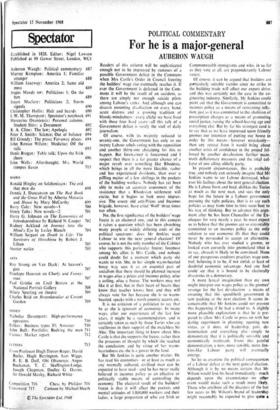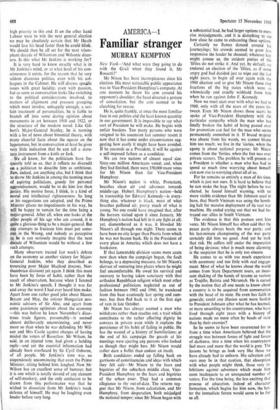For he is a major-general
POLITICAL COMMENTARY
AUBERON 'WAUGH Readers of this column will be sophisticated enough not to be impressed by rumours of a possible Government defeat in the Commons
when Mrs Castle's Order in Council freezing the builders' wage rise eventually reaches it. If ever the Government is defeated in the Com- mons it will be the result of an accident, as there are simply not enough suicide pilots
among Labour's ranks. And although one can
discern mounting disaffection on every hand, acute distress and a growing tradition of bloody-mindedness—every cliche' we have lived with these four hard years—all this talk of a Government defeat is surely the stuff of daily journalism.
Of course, with its majority reduced to seventy-one, the Government has only to see twenty Labour rebels voting with the opposition And another thirty-one abstaining for this to
happen. But fdreivarned is forearmed and I suspect that there is a far greater chance of a major revolt over something like Rhodesia, which brings in all the more likeable, rasher and less experienced dissidents, than over a piffling matter of a few shillings in the pockets of the building workers. Nobody has yet been able to make an accurate assessment of the resistance that a Rhodesian settlement will excite, but it begins to look most Unpres7 sive. The crusty old anti-Prices and Incomes brigade, however, have cried 'Wolf' three times too often.
No, the first significance of the builders' wage freeze is an electoral one, and in this context it raises a question which has been absorbing Many people at widely differing ends of the political spectrum: does Mr Jenkins want Labour to win the next general election? Of course, he is not the only member of the Cabinet who 'supports this- particular freeze; foremost among his allies is Mrs Castle, and nobody could doubt for a moment which party she wants to win. She in her simple warm-hearted bossy way sees it as an essential part of socialism that there should be planned increase in wages alias a prices and incomes policy, alias a ceiling, alias a freeze. The workers may not like it at first, but in their heart of hearts they know that teacher knows best, and they will always vote for her because she is so warm- hearted, speaks with a north country accent. etc.
It is no criticism of a politician to say that he or she is ignorant of economics. In many ways, after our experiences of the last few years, it might be a recommendation, and is certainly taken as such by those Tories who are vociferous in their support of the matchless Sir Alec. The important thing to know about Mrs Castle is that she supports the freeze, rather than the processes of thought by which she reached the conclusion; and by virtue of her warm- heartedness etc she is a power in the land.
But Mr Jenkins is quite another matter. He has read his economics--or at least as much as any normally cultured, civilised man can be expected to have read—and he has never really believed in incomes policy as an effective or politically viable means of controlling the economy. The electoral result of the builders' freeze is that it will affect the pockets and mental attitudes of 1,800,000 workers and their ladies, a large proportion of who are Irish or
Commonwealth immigrants and who, in so far as they vote at all, are preponderantly Labour voters.
Of course, it can be argued that builders are particularly suitable victims since no strike in the building trade will affect our export drive, and this was certainly not the case in the en- gineering industry. Similarly, Mr Jenkins could
point out that the Government is committed to incomes policy as a means of restraining infla- tion, just as it was committed to the abolition of
prescription charges as a means of promoting
social justice, raising the school-leaving age and everything else. But by far his strongest card is to say that as we have impressed upon friendly gnomes our intention of putting our house in order by this means—however mistakenly— then any retreat from it would bring about another crisis of confidence in the pound fol- lowed by another devaluation, further math-, moth deflationary measure's and the total col- lapse of one ailing, elderly party.
In present circumstances, this is probably
true, and nobody 'can seriously imagine that Mr Jenkins wants to sec Labour destroyed, what- ever his feelings about the next general cleat/on.
He is Labour born and bred, dislikes the Tories as much as the next man, and sees the only
hope for the future in a Labour governnient
Pursuing the right policies, that is to say such policies as may from time to time seem best to
his way of thinking. But to advance this argu-
ment after hC has been Chancellor of the Ex- chequer for very nearly a year. he must expect us to believe that the gnomes are so irrevocably committed to an incomes policy as the only solution to our economic ills that they could
never be persuaded to accept an alternatiie.
Nobody who has ever studied a gnome, Or looked even cursorily into gnomcland (that is to say, abroad) is likely to be convinced. None of our prosperous creditors practises wage con- trol, believing it to be, if not sinful, at least of doubtful economic advantage. And any fool could see that it is bound to be electorally disastroUs in a democracy.
A more lyrical imagination than my own might interpret our wages policy as the gnomes' revenge for the last devaluation -a means of ensuring that this spendthrift government is sent packing at the next election. It seems in- conceivable that Mr Jenkins could not prevent this happening if he had a mind to. A slightly more plausible explanation is that he is pre- pared to allow Mrs Castle to press on with her daring experiment in planning. opening new vistas, as it does, of leadership, guts, de- termination and everything else—simply to demonstrate that it is politically unviable and economically irrelevant. From this painful demonstration, a new, more sensible. more Jen- kins-like Labour party will eventually emerge.
So let us examine the political consequences of a Labour defeat at the next general election.
Although it is by no means certain that Mr Wilson would lose his head immediately—much depends upon the circumstance—no other event would make such a result more likely. Those who attribute all the disasters of the last few years to Mr Wilson's brand of leadership might reasonably be expected to give quite a
high priority to this end. If on the other hand Labour were to win the next general election we may be absolutely certain that Mr Heath would lose his head faster than he could blink. We should then be all set for the next trium- phant decade of Wilsonism and Wilsonic disas- ters. Is this what Mr Jenkins is working for?
It is very hard to know exactly what is in Mr Jenkins's mind, or at what level of his con- sciousness it exists, for the reason that he very seldom discusses politics, even with his col- leagues in the Cabinet. He will discuss specific issues with great lucidity, even with passion, but as soon as conversation looks like switching to the political considerations involved, to matters of alignment and pressure grouping which must involve, unhappily enough, a cer- tain treatment of personalities, he is liable to branch off into some daring opinion about movements in art between 1918 and 1922, or the structure of the modern novel. Like Gil- bert's Major-General Stanley, he is teeming with a lot of news about binomial theory, with many cheerful facts about the square on the hypotenuse, but in conversation at least he gives very little indication that he can tell a statu- tory instrument from a knife or fork.
We all know, for the politicians have fre- quently told us so, that it reflects no discredit op a politician to describe him as ambitious. Few, indeed, are anything else, but I think that to throw Mr Jenkins in among the teeming mass of aspiring politicians, greedy for personal aggrandisement, would be to do him less than justice. His motive force, I think, is a kind of moral and intellectual righteousness. So long as his suggestions are adopted, and the Prime Minister places no impediments in his way, he will be happy to remain for the time being a major-general. After all, when one looks at the other people of his age who are around, it is %lite a glorious thing to be a major-general. But any attempts to frustrate him must put some- one in the Wrong, and nobody as perceptive as he is can seriously imagine that the next decade of Wilsonism would be without a few such attempts.
Many observers treated last week's debate on the economy as another victory for Major- General Jenkins, who they described as trouncing poor Major Macleod (DAQMG, Nor- thumbrian division) yet again. I think this must have been by force of habit, rather than the result of observation, because when I listened to Mr Jenkins's speech, I thought it was far. and away the worst I had ever heard him make. Apart from one rather good joke about Messrs Bryant and May, the sinister Hungarian eco- nomic advisers of Sir Alec, and apart from some passionate optimism about the economy —this was before he knew November's disas- trous trade figures, presumably—it seemed almost deliberately unconvincing, and never more so than when he was defending Mr Wil- son and Mrs Castle against charges of having misled the voters of Bassetlaw. Mr Wilson, he said, in an injured tone, had given a holding reply—and yet the essential information had already been overheard by Sir Cyril Osborne, of all people. Mr Jenkins's tone was so stupendously unconvincing that even the Prime Minister, sitting behind him, laughed. Now Mr Wilson has an excellent sense of humour, but it is one which is totally devoid of any element of self-mockery, and the only conlusion to be drawn from this performance was that he wished to dissociate from Mr Jenkins's weak defence of himself. He may be laughing even louder before very long.







































 Previous page
Previous page